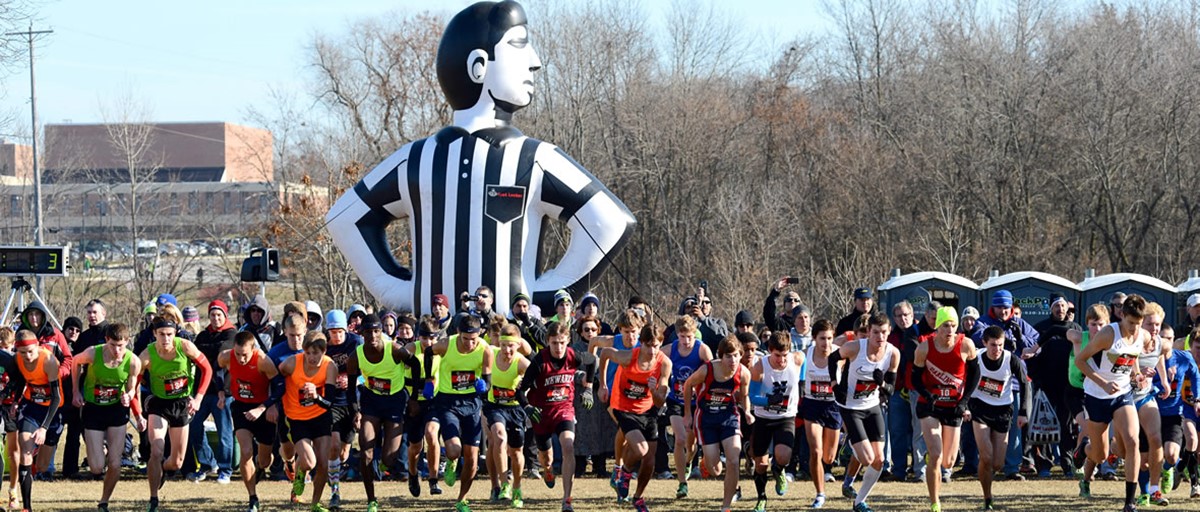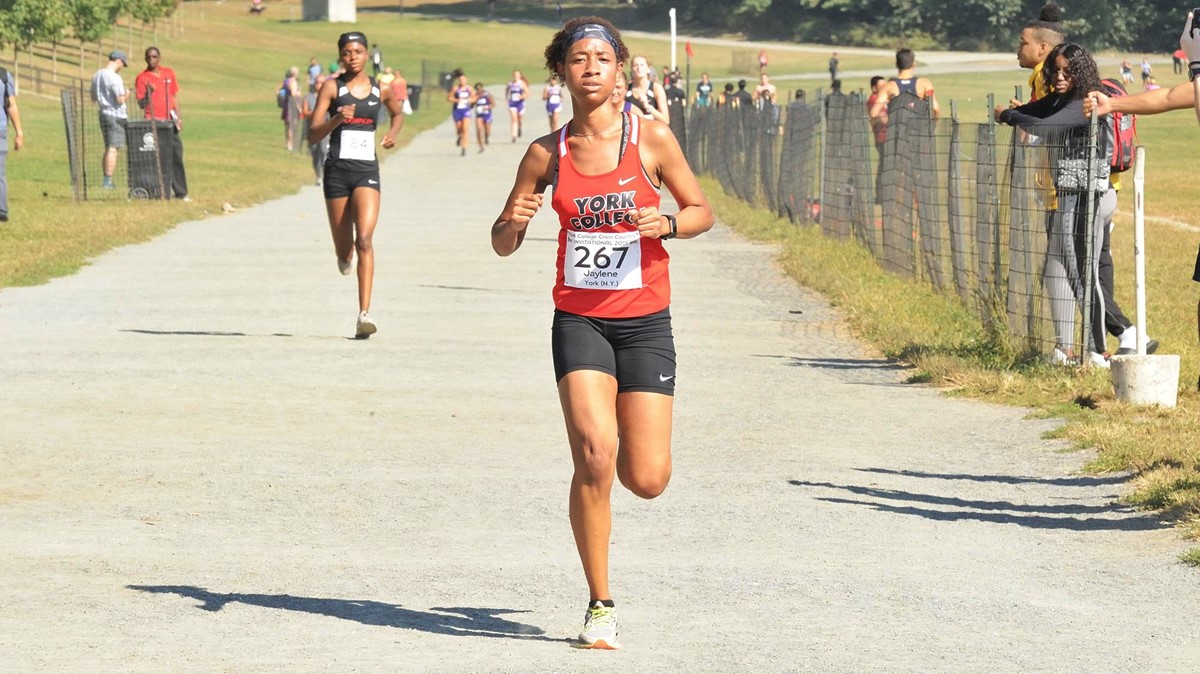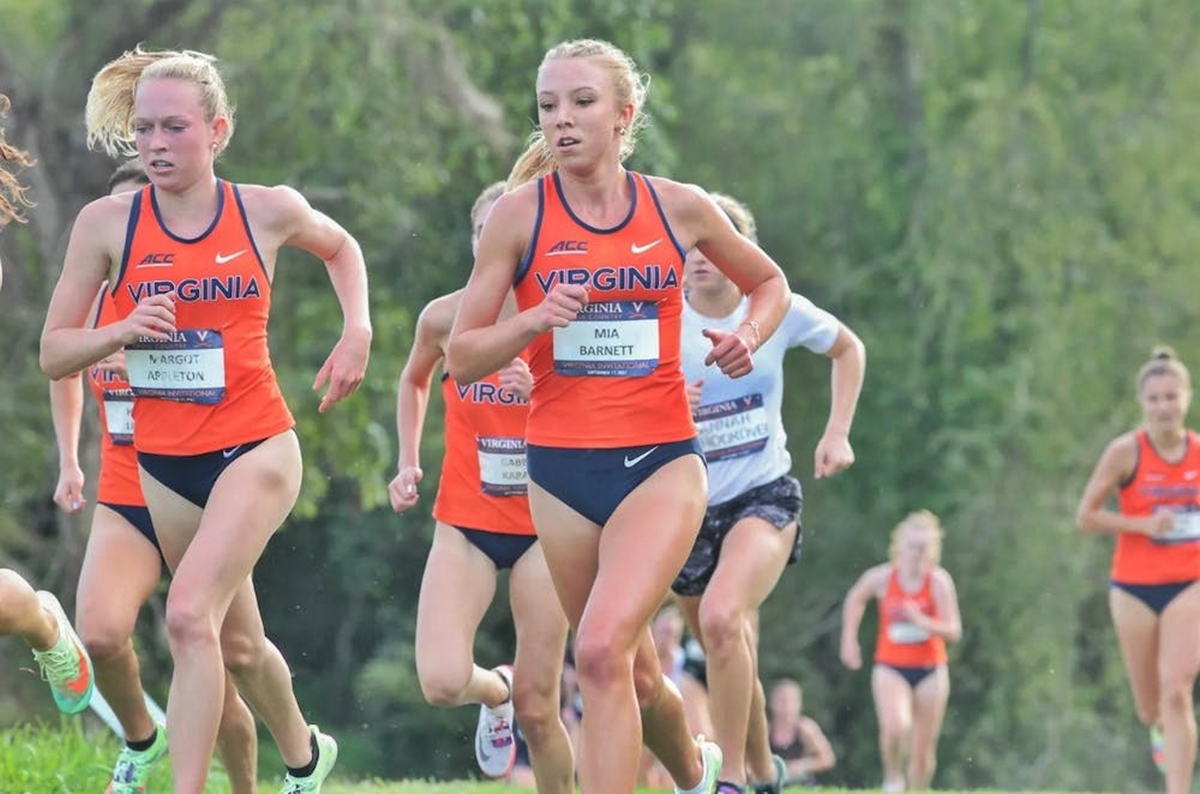

Featured
Why Cross Country Is A Sport
Modified: January 2, 2024
Discover why cross country is considered a sport with featured athletes showcasing their passion, dedication, and endurance in this thrilling athletic pursuit.
Introduction
When we think of sports, images of umpires, referees, and cheering crowds come to mind. We envision athletes competing on fields, courts, and tracks, pushing their bodies to the limit in pursuit of victory. However, there is one sport that often goes unnoticed and underappreciated – cross country.
Cross country is a unique and demanding sport that combines aspects of endurance, strength, and strategy. It involves racing over various terrains, typically through open fields, wooded trails, or hilly landscapes. Unlike many traditional sports, cross country does not rely on flashy moves or team dynamics; instead, it emphasizes individual effort, mental fortitude, and the ability to navigate challenging courses.
What sets cross country apart from other sports is its focus on long-distance running. Athletes cover distances ranging from 5 to 10 kilometers, often in challenging weather conditions. The unforgiving nature of the sport requires physical fitness, mental resilience, and strategic planning.
While cross country may not have the same level of popularity as football or basketball, it is no less deserving of recognition as a sport. In fact, it offers several unique characteristics that make it a compelling activity for both participants and spectators alike.
In this article, we will explore the definition of a sport, delve into the characteristics of cross country, examine the physical demands and training involved, discuss competitions and scoring, explore the mental and strategic aspects, and highlight the numerous benefits of participating in cross country.
So, let’s lace up our running shoes and dive into the world of cross country – a sport that not only challenges the body but also nourishes the mind and spirit.
Definition of a Sport
Before we delve into the world of cross country, let’s establish what defines a sport. While the term “sport” may seem self-explanatory, it can be subjective and open to interpretation. Generally, a sport is considered an organized physical activity that involves competition between individuals or teams and follows a set of rules or guidelines.
Sports often require skill, strategy, and physical exertion, with the goal of determining a winner based on performance or achievement. They can be classified into various categories such as team sports, individual sports, combat sports, and recreational sports.
Cross country undoubtedly falls under the category of an individual sport. Although it may lack the popular appeal of sports like football or basketball, it possesses the essential elements that define a sport. It involves competition between athletes, adheres to rules and regulations, and demands physical abilities that are developed through training and practice.
Within the realm of cross country, athletes participate in races where they aim to complete a designated course in the shortest amount of time. These races are often conducted in organized events and can take place on a variety of terrains, testing the runners’ abilities to adapt and overcome obstacles.
Furthermore, cross country also embodies the spirit of sportsmanship and camaraderie. While individuals are ultimately competing against each other, there is a sense of mutual respect and support among participants. The grit and determination required to succeed in cross country create a bond among athletes that transcends the competition itself.
So, as we explore the world of cross country, let us acknowledge and recognize it as a sport that embodies the essence of competition, physical exertion, and the pursuit of excellence.
Characteristics of Cross Country
Cross country is a sport that possesses unique characteristics that set it apart from other sports. Understanding these key aspects helps to appreciate the challenges and allure of participating in this demanding discipline.
1. Endurance: One of the defining features of cross country is the emphasis on endurance. Athletes must have the stamina to sustain a fast pace over long distances. Whether it’s running through muddy trails or conquering steep hills, cross country tests an athlete’s ability to maintain their speed and power throughout the race.
2. Varied Terrain: Cross country courses can encompass a wide range of terrains, including grassy fields, rugged trails, and even pavement. This diversity adds an element of unpredictability and excitement to races, as athletes must adapt to the changing surfaces and adjust their strategies accordingly.
3. Individual Effort: Unlike team sports where success is dependent on collaboration and coordination with teammates, cross country places a heavy emphasis on individual effort. Athletes are responsible for their own performance, pushing themselves to reach their full potential and achieve personal bests.
4. Mental Fortitude: Cross country is not only physically demanding but also mentally challenging. Athletes must overcome fatigue, push through discomfort, and maintain focus throughout the race. Mental resilience and the ability to stay motivated are crucial for success in this sport.
5. Strategic Racing: While cross country appears to be a simple race to the finish line, there is a strategic component involved. Athletes need to plan their pacing, make tactical decisions on when to surge or conserve energy, and navigate obstacles and challenging sections of the course effectively.
6. Team Unity: Although cross country is primarily an individual sport, it also cultivates a strong sense of team unity. Runners from the same school or club often train together and support each other during races. Team scores are calculated based on the performance of individual athletes, fostering a supportive and communal atmosphere.
These characteristics of cross country combine to form a sport that demands physical and mental strength, strategy, and individual drive. It is a true test of an athlete’s endurance, resilience, and ability to adapt to different environments. These elements make cross country a captivating and exhilarating sport for both participants and spectators alike.
Physical Demands of Cross Country
Cross country is renowned for being one of the most physically demanding sports out there. Athletes must possess a high level of fitness and endurance to tackle the challenges that come with racing over long distances in various terrains.
1. Cardiovascular Fitness: Cross country races are cardiovascular endurance tests. Athletes must have strong heart and lungs to sustain a high level of aerobic activity for extended periods. This enables them to deliver oxygen-rich blood to the muscles and maintain a steady pace throughout the race.
2. Muscular Strength: The nature of cross country requires athletes to have well-developed muscles, particularly in the legs and core. They must generate power to propel themselves forward and conquer inclines and uneven terrain. Strong leg muscles also help to absorb impact and reduce the risk of injuries.
3. Endurance Training: Training for cross country involves a significant focus on building endurance. Athletes engage in long-distance runs, gradually increasing their mileage to improve their aerobic capacity. This allows them to withstand the physical demands of the race and maintain a strong pace without succumbing to fatigue.
4. Speed and Agility: While endurance is key in cross country, athletes also need speed and agility to navigate the twists and turns of the course. They must be able to change direction quickly, adapt their stride length, and accelerate when necessary to gain an advantage over their opponents.
5. Balance and Coordination: Cross country courses often feature uneven surfaces, trails with obstacles, and varying weather conditions. Athletes must possess good balance and coordination to maintain stability and maneuver through these challenging environments effectively.
6. Mental Toughness: The physical demands of cross country are not just limited to the body; they also tax the mind. Athletes must develop mental toughness to push through physical discomfort, maintain focus, and not let fatigue hinder their performance during intense races.
Cross country requires athletes to be well-rounded in terms of physical fitness. It demands a combination of cardiovascular endurance, muscular strength, speed, agility, balance, and mental fortitude. The physical demands of the sport are what make it both grueling and rewarding, pushing athletes to their limits and showcasing the incredible capabilities of the human body.
Training and Preparation
To excel in cross country, athletes must undergo rigorous training and meticulous preparation. The sport demands a delicate balance of endurance, strength, speed, and mental resilience. Here are some key aspects of training and preparation for cross country:
1. Progressive Running: Training for cross country involves gradually increasing the distance and intensity of runs over time. Athletes begin with shorter runs and gradually build up to longer distances, helping their bodies adapt to the demands of the sport.
2. Interval Training: Interval training is an essential component of cross country preparation. It involves alternating between high-intensity bursts of running and periods of recovery. This type of training builds anaerobic endurance, improves speed, and enhances overall cardiovascular fitness.
3. Strength Training: Cross country runners need strong muscles to propel themselves forward and withstand the physical demands of the sport. Strength training exercises, such as squats, lunges, and core work, help to build muscular strength and stability.
4. Hill Repeats: Hills are a common feature in cross country courses, requiring athletes to develop the strength and technique to conquer them. Hill repeats involve running up a hill at a challenging pace and repeating this sprint several times. This type of training improves leg strength, power, and mental toughness.
5. Flexibility and Mobility: Cross country runners should also prioritize flexibility and mobility training. Stretching exercises, yoga, and foam rolling help to improve range of motion, prevent injuries, and enhance recovery.
6. Mental Training: In addition to the physical aspect, mental training plays a crucial role in preparing for cross country. Visualization techniques, goal-setting exercises, and developing mental resilience can help athletes stay focused, motivated, and confident during races.
7. Proper Nutrition and Rest: To optimize performance and recovery, cross country runners must pay attention to their nutrition and rest. A well-balanced diet, consisting of carbohydrates, proteins, healthy fats, and adequate hydration, fuels the body for training and competition. Sufficient rest and sleep are also essential for recovery and injury prevention.
Training and preparation for cross country require a combination of physical and mental conditioning. By following a well-rounded training plan that focuses on endurance, strength, speed, and mental toughness, athletes can ensure that they are ready to tackle the challenges that come with racing in this demanding sport.
Competitions and Scoring
Cross country competitions offer athletes the opportunity to showcase their skills and compete against fellow runners. These events are structured in a way that allows for fair competition and the determination of individual and team rankings. Here’s a look at how cross country competitions are organized and scored:
1. Individual Rankings: In cross country, individual rankings are determined by the order in which runners finish the race. The athlete with the fastest overall time is declared the winner. This provides a clear measure of individual performance and rewards those who are able to complete the course in the shortest amount of time.
2. Team Scoring: Cross country also incorporates a team scoring system where teams compete against each other based on the performance of their top runners. Typically, the top five or seven finishers from each team contribute to the team’s score. The team with the lowest cumulative score wins the meet.
3. Scoring Methods: Two common scoring methods in cross country are the “cross country point system” and the “cross country place scoring system.” In the point system, individual runners receive points corresponding to their finishing position, with the lowest total score indicating the winner. In the place scoring system, individual runners are ranked based on their finishing position, and the team with the lowest sum of ranks wins.
4. Seasonal Tournaments: Cross country competitions often culminate in seasonal tournaments, such as regional or state championships. These tournaments bring together teams and individuals from different schools or districts to compete for titles and recognition. They offer a higher level of competition and an opportunity for athletes to qualify for national or international events.
5. Relay Races: In addition to individual and team races, cross country sometimes features relay events. Relay races involve teams of runners taking turns to complete a portion of the race. This format adds an element of teamwork and strategy as athletes coordinate their efforts to ensure smooth transitions and maintain a competitive pace.
Cross country competitions provide a platform for athletes to showcase their speed, endurance, and competitive spirit. The combination of individual rankings and team scoring creates an exciting and dynamic environment. Whether it’s competing for personal bests, team victories, or championship titles, cross country events offer a thrilling experience for both athletes and spectators alike.
Mental and Strategic Aspects
Cross country is not only a test of physical endurance but also a sport that requires athletes to engage in mental and strategic preparation. The mental and strategic aspects of cross country play a crucial role in an athlete’s performance and ability to excel in races. Here are some key factors to consider:
1. Mental Resilience: Cross country races can be physically demanding and mentally challenging. Athletes must develop mental resilience to push through fatigue, discomfort, and the temptation to give up. Maintaining a positive mindset, focusing on goals, and utilizing coping strategies are essential for performing at one’s best.
2. Race Pacing: One of the critical strategic elements in cross country is race pacing. Runners must assess the course, their fitness level, and competition to determine the optimal pace for the race. Starting too fast can lead to burnout, while starting too slow can result in being left behind. Finding the right balance is key for a successful race.
3. Course Familiarization: Before a race, athletes often have the opportunity to familiarize themselves with the course. This strategic advantage allows them to understand the terrain, identify challenging sections, and plan their approach accordingly. Knowing when to push, when to conserve energy, and where to make strategic moves can give runners an edge over their competitors.
4. Strategic Surges: Cross country races often involve fluctuations in speed and intensity. Strategic surges are well-timed bursts of increased effort to gain an advantage over opponents. These surges can be used to overtake competitors on challenging sections, break away from a pack, or respond to an opponent’s move.
5. Mental Focus and Visualization: Maintaining mental focus throughout a race is crucial. Athletes use visualization techniques to rehearse the race, mentally prepare for challenging moments, and envision success. Visualizing a strong finish or a successful surge can provide the motivation needed to push through difficult stretches.
6. Adaptability: Cross country races can present unexpected circumstances, such as changes in weather, course conditions, or the performance of competitors. Being adaptable and having the ability to adjust race strategies in real-time is essential. Athletes must be prepared to adapt their pacing, make tactical decisions, and adjust to the environment to optimize their performance.
The mental and strategic aspects of cross country require athletes to be disciplined, focused, and adaptable. Building mental resilience, strategically pacing themselves, and making well-timed moves can greatly enhance an athlete’s performance in this demanding sport. By combining physical prowess with mental strength, cross country runners can reach their full potential and achieve remarkable results on the course.
Benefits of Cross Country
Participating in cross country provides numerous benefits that extend beyond the physical realm. Whether you’re a competitive athlete or a recreational runner, there are several advantages to be gained from engaging in this demanding sport. Here are some key benefits of cross country:
1. Improved Cardiovascular Health: Cross country is an excellent cardiovascular exercise that promotes a healthy heart and improved overall cardiovascular fitness. Regular participation in cross country helps to strengthen the heart, lower blood pressure, and improve lung capacity.
2. Increased Endurance: Cross country training and races are designed to build endurance. Long-distance running sessions help to improve aerobic capacity, allowing athletes to run longer distances and maintain their pace over time. This enhanced endurance can be beneficial in other sports and everyday activities.
3. Stronger Muscles and Bones: The nature of cross country running, particularly over varied terrains, helps to develop muscular strength and stamina. The repetitive impact of running also strengthens bones, reducing the risk of osteoporosis and other bone-related conditions later in life.
4. Weight Management: Cross country running is an effective way to burn calories and manage weight. The high-intensity nature of the sport, combined with the longer duration of training sessions, can contribute to weight loss and maintenance of a healthy body weight.
5. Mental Well-being: Engaging in cross country can have a positive impact on mental health. Regular exercise, particularly aerobic activities like running, releases endorphins that promote feelings of happiness and reduce stress and anxiety. It also provides an avenue for stress relief and a sense of accomplishment.
6. Discipline and Goal Setting: Cross country requires discipline and dedication. Athletes must follow a training regimen, commit to regular workouts, and set goals for themselves. This helps to cultivate discipline, focus, and perseverance, both on and off the racecourse.
7. Team Bonding and Camaraderie: While cross country is primarily an individual sport, it also offers opportunities for team camaraderie and bonding. Being part of a cross country team allows athletes to build relationships, support one another, and foster a sense of belonging and teamwork.
8. Time Outdoors and Connection with Nature: Cross country takes place in natural settings, often in beautiful parks or scenic trails. This allows athletes to connect with nature, enjoy fresh air, and appreciate the beauty of their surroundings while engaging in physical activity.
9. Lifelong Fitness Habits: Cross country instills the importance of regular physical activity and can establish a foundation for lifelong fitness habits. The discipline, dedication, and love for running cultivated in cross country can extend well beyond the competitive years and contribute to a healthier lifestyle.
From physical fitness to mental well-being, cross country offers a multitude of benefits for participants. The combination of endurance training, teamwork, and the connection to nature make it a uniquely rewarding and fulfilling sport for athletes of all ages and abilities.
Conclusion
Cross country is more than just a sport; it is a testament to human resilience, perseverance, and the pursuit of excellence. This unique discipline combines physical fitness, mental fortitude, and strategic thinking, making it a demanding yet highly rewarding activity.
Throughout this article, we have explored the various aspects that make cross country a sport worth recognizing and celebrating. From its defining characteristics and physical demands to the mental and strategic aspects, cross country encapsulates the essence of a true sport.
Participating in cross country offers many benefits, including improved cardiovascular health, increased endurance, stronger muscles and bones, and mental well-being. It teaches discipline, goal-setting, teamwork, and fosters a lifelong commitment to fitness.
Whether you’re a competitive athlete striving for victories and personal records, or a recreational runner seeking the physical and mental benefits of exercise, cross country provides a platform for growth, self-discovery, and achievement.
So, lace up your running shoes, embrace the challenges, and embark on a journey of self-improvement through the world of cross country. Let the open fields, wooded trails, and exhilarating competitions become the backdrop for your passion, determination, and triumphs. Cross country awaits, ready to test your limits and unlock your potential.









